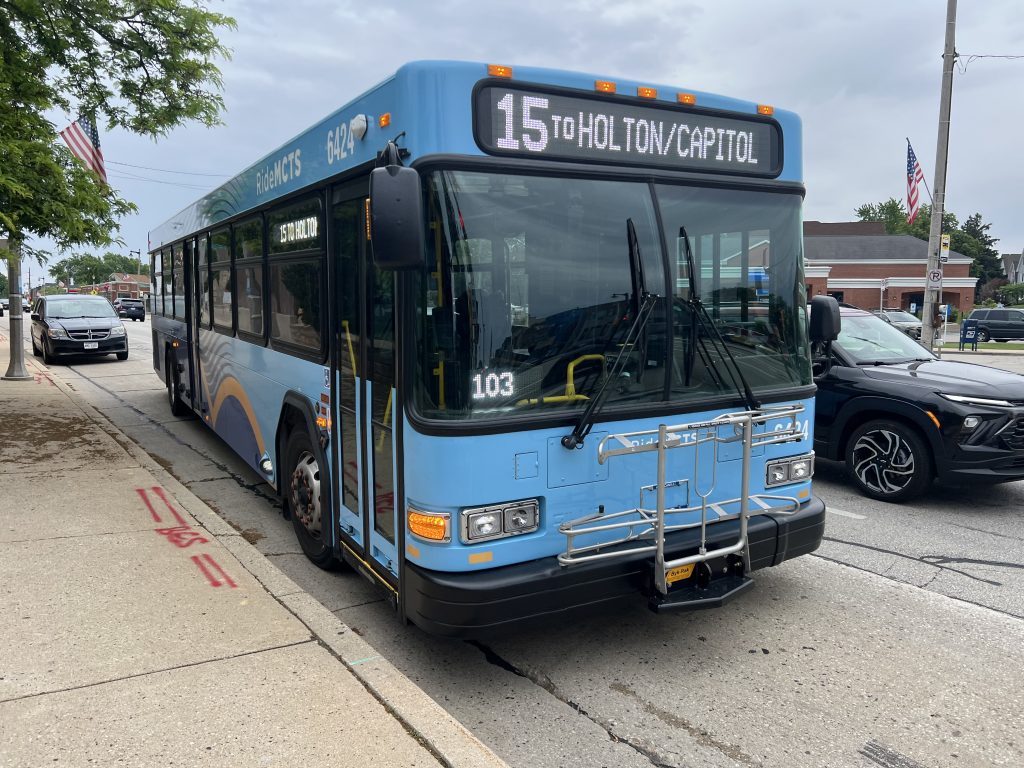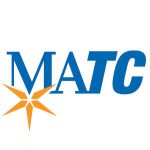Will County Hike Wheel Tax to Fund Buses?
Facing deep transit cuts, some supervisors consider raising 'extremely unpopular tax.'

6400 series Milwaukee County Transit System (MCTS) bus. Photo by Jeramey Jannene.
The Milwaukee County Board is starting to look at hiking the county’s vehicle registration fee (VRF) — commonly called the wheel tax — as the government runs out of money, particularly for public transit.
During a recent budget meeting, Sup. Shawn Rolland suggested policymakers should consider increasing the VRF and pegging future increases to inflation. The VRF is $30 and it has not been raised since it was adopted in 2016.
More recently, during a budget meeting on Oct. 24, Sup. Anne O’Connor sponsored an amendment to the 2026 budget that asks the administration and county comptroller to evaluate using the VRF to raise funding for transit.
The Milwaukee County Transit System (MCTS) faces a $14 million budget deficit in 2026. The system’s response is a budget proposal that cuts six bus routes, reduces service along many other routes, raises fares from $2 to $2.75 and the daily fare cap from $5 to $8.25.
To close the 2026 gap with a VRF increase, policymakers would need to raise the fee to $55, according to a budget analysis by the Office of the Comptroller.
State law constrains how the county can raise revenue through property tax and sales tax levies. The VRF remains the only lever policymakers can pull to raise revenue without first going to the state capitol for authorizing legislation. Across Wisconsin, counties and municipalities, including the City of Milwaukee, are increasingly turning to the VRF to raise revenue.
During the last decade, former Milwaukee County Executive Chris Abele tried repeatedly to raise the wheel tax to fund transit. The county board blocked it every time. In 2017, when Abele tried to raise the VRF from $30 to $60, Sup. Willie Johnson, Jr., who today chairs the Committee on Finance, called the proposal “political suicide.”
O’Connor is not actually pushing to raise the VRF. She told her colleagues she wants the report next year in order to facilitate a “full and robust discussion” with no “predetermined outcomes.”
The Committee on Finance adopted the amendment and the full board will vote on it during the annual budget adoption in November.
The VRF is expected to generate $17.2 million in 2026. County Executive David Crowley‘s proposed budget allocates all of the funding to MCTS.
Sup. Steve Taylor called VRF increases “extremely unpopular” and said the board learned that under the Abele administration: “You’re having people with cars, having to help fund people that don’t have cars.” Taylor was the lone member of the committee to vote against O’Connor’s amendment.
“This should not be a board driven thing either,” Taylor said. “Why should we be the bad guys to do it? Let the county executive introduce this in the future.”
Sup. Sequanna Taylor, who voted in favor of a VRF report, said she’s not comfortable raising the wheel tax. To her colleagues that have joined the board since 2020, Taylor noted the new reality they face: “This is life without ARPA funding, without Covid dollars, without us saying there’s a surplus because there isn’t.”
Federal stimulus funds have, in particular, kept MCTS solvent. The system received $192 million from the federal government during the COVID-19 pandemic and it has used the funding to plug the structural gap in its budget ever since. The system will spend the rest of the funds in 2026, revealing a fiscal cliff for the first time in five years.
The federal funding was supposed to get the system through 2026 and into 2027 before budget deficits started showing up again. But the system found itself over-budget in 2025 and needing the spend down additional stimulus funds just to balance the budget.
Pushing back against Sup. Steve Taylor’s characterization of the VRF, Sup. Justin Bielinski contrasted VRF increases with the fare increases being proposed in 2026. The monthly fare cap is increased by $24, which adds up to $288 a year, he noted.
“So that comes out to a $288 increase in their wheel tax,” Bielinski said. “So I have more of a concern for the people who can’t afford a car than like the people who do have a car, who are mad about paying, whatever, $5, $10 more, or whatever it ends up being at some point in the future, on a wheel tax once a year.”
If you think stories like this are important, become a member of Urban Milwaukee and help support real, independent journalism. Plus you get some cool added benefits.
More about the 2026 Milwaukee County Budget
- Transportation: MCTS Budget Picture Keeps Getting Worse - Graham Kilmer - Dec 4th, 2025
- Transportation: MCTS Avoids Full Route Cuts Under New Plan - Graham Kilmer - Nov 27th, 2025
- MKE County: Crowley Signs $1.3 Billion Budget Without Vetoes - Graham Kilmer - Nov 11th, 2025
- County Executive Crowley, Chairwoman Nicholson-Bovell Approve 2026 County Budget - David Crowley - Nov 7th, 2025
- MKE County: Board Adopts 2026 Budget, Reduces Size of MCTS Cut - Graham Kilmer - Nov 6th, 2025
- Supervisor Sequanna Taylor Highlights Key Co-Sponsorships in 2026 Milwaukee County Budget - Sequanna Taylor - Nov 6th, 2025
- Supervisor Martin Applauds Board Approval of Cooper Park Repair Amendment - Sup. Felesia Martin - Nov 6th, 2025
- Milwaukee County Board Advances Budget Amendments to Strengthen Transit, Health, Housing, and Family Well-Being While Reducing the Tax Levy - County Board Chairwoman Marcelia Nicholson - Nov 6th, 2025
- Milwaukee County Executive David Crowley Statement on 2026 Amended Budget - David Crowley - Nov 6th, 2025
- Transportation: Supervisors Use Parliamentary Moves To Save MCTS - Graham Kilmer - Oct 31st, 2025
Read more about 2026 Milwaukee County Budget here
Political Contributions Tracker
Displaying political contributions between people mentioned in this story. Learn more.
- June 30, 2016 - David Crowley received $1,000 from Chris Abele
MKE County
-
Fellow Judge Testifies in Dugan Case
 Dec 16th, 2025 by Graham Kilmer
Dec 16th, 2025 by Graham Kilmer
-
Key Questions in Dugan Trial Take Shape on First Day
 Dec 15th, 2025 by Graham Kilmer
Dec 15th, 2025 by Graham Kilmer
-
FTA Tells Milwaukee to Crack Down on Fare Evasion — Even Where Fares Don’t Exist
 Dec 12th, 2025 by Graham Kilmer
Dec 12th, 2025 by Graham Kilmer
Transportation
-
Congestion Pricing Cuts Air Pollution in New York City
 Dec 14th, 2025 by Jeff Wood
Dec 14th, 2025 by Jeff Wood
-
FTA Tells Milwaukee to Crack Down on Fare Evasion — Even Where Fares Don’t Exist
 Dec 12th, 2025 by Graham Kilmer
Dec 12th, 2025 by Graham Kilmer
-
Will GOGO’s Bus Service Ever Get Going?
 Dec 9th, 2025 by Jeramey Jannene
Dec 9th, 2025 by Jeramey Jannene





















I think our priorities are mixed up. We are spending a lot of money on a new entrance for the Zoo and the Domes, but are cutting buses and not fixing County infrastructure from the floods. Would a new entrance to the Zoo be nice, sure and an upgrade to the Domes…meh, but buses are essential to many peoples existence. This needs to become a priority!
I’m glad the County Board is finally willing to try to find a solution to this very serious issue.
However, I think the first priority is to replace the inept management at MCTS. They are the ones who created this mess. Even if a solution was found or a wealthy donor gifted MCTS $20 million tomorrow, unless a competent management team is in there with a viable solution to the ever increasing number of fare evaders, it would be staying on the same merry-go-round. Replacing the current management team at MCTS should be the first priority!
This is a flat, regressive tax.
The wheel tax and registration in general should be applied to the value of the car. More expensive cars should see higher fees than cheaper ones, this progressive tax would be a lot more fair to everyone, and still help with the increased funding.
Flat taxes aren’t fair for income taxes, why should autos be any different? (rhetorical question)